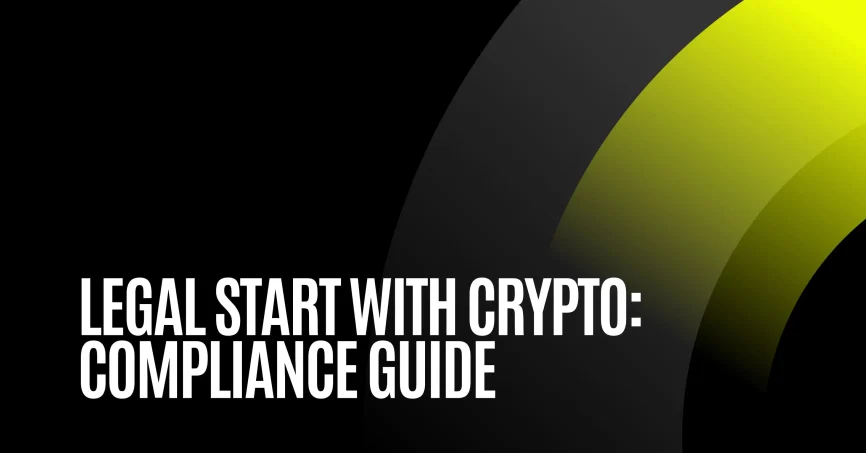Crypto Compliance Guide for Businesses

Everything companies need to know to integrate crypto payments and accounts with full compliance.
Table of contents:
Why legal compliance is critical
A clear compliance setup protects revenue and keeps your business operational in different countries. It also unlocks scale across borders – the regulatory grace period for crypto assets in most jurisdictions is coming to an end, which puts new obligations on businesses that accept and send crypto payments. So, a crypto regulations guide can help avoid a series of potential challenges.
The Risks of Ignoring Compliance
1. Fines and legal penalties
What happens: Regulators can issue multi-million or even billion-dollar penalties for BSA/AML failures, missing MSB registration, or weak controls. FinCEN’s action against Binance assessed a US$3.4B civil penalty and imposed a 5-year monitorship. FinCEN has also penalized unregistered exchangers and MSBs.
How to prepare: Work with providers who have AML/KYC programs, registration where required, and ongoing transaction monitoring.
2. Frozen accounts and blocked transactions
What happens: Payments involving sanctioned persons or embargoed regions must be blocked. Banks and payment partners can freeze funds during reviews or close accounts for sanctions or AML red flags.
How to prepare: Sanctions screening at onboarding, clear escalation paths, and audit-ready logs. Align to FATF Travel Rule data-sharing if applicable.
3. Loss of customer trust
What happens: EU regulators have warned crypto providers not to misrepresent their regulatory status, and the UK FCA has forced record volumes of promotions to be amended or withdrawn. Working with the wrong provider can lead to failed marketing campaigns, customer complaints, and other issues.
How to prepare: Plain, accurate disclosures about partnerships, screening, and choice of provider. This supports CoinsPaid’s own brand promise of secure, compliant processing.
4. Barriers to scaling internationally
What happens: Without the right authorisations, you cannot provide services or enter key markets. In the EU, MiCA sets uniform rules for CASPs and is phasing in across 2024–2025. Supervisors are scrutinising cross-border “passporting” and may tighten oversight.
How to prepare: Map where you operate, confirm if you fall under MSB or CASP rules, and align with a compliant service provider to ensure you can process digital assets safely.
Full crypto compliance checklist for businesses
Use this before kickoff and keep it as your go-live control sheet to get your legal start with crypto.
1. Define your crypto use case
☐ Understand flows: pay-in, pay-out, treasury, settlement.
☐ Map actors: payer, payee, merchant entity, provider.
☐ Pick currencies: BTC, ETH, USDT, etc.
☐ Set target markets: list jurisdictions for day-one launch and expansions.
Output: payment flow diagram, currency list, country list.
2. Check local regulations
☐ Confirm if your model triggers MSB/CASP/VASP duties.
☐ List the regulating authority for each country (e.g., FinCEN, FCA, BaFin).
☐ Record obligations: registration, reporting, record retention, travel-rule.
☐ Note restricted geographies and sanctioned parties.
Output: rules register (country → duties → status → owner → review date).
3. Choose a regulated provider
☐ Check licensing/registration and ISO 27001.
☐ Request AML/KYC policy summaries and relevant documents.
☐ Review supported coins, stablecoins, and fiat off-ramps.
☐ Confirm integrations/API options and SLA for support.
Output: vendor due diligence pack and sign-off from Compliance.
4. Prepare KYB (company verification)
☐ Legal docs: certificate of incorporation, articles, registry extract.
☐ UBOs: IDs, proof of address, ownership chart.
☐ Directors/signers: IDs and proof of authority.
☐ Company info: website, business model, jurisdictions served.
Output: prepared KYB folder, single short brief, Compliance contacts.
5. Build an AML/KYC framework
☐ Appoint MLRO/AML officer and set escalation contacts.
☐ Draft customer risk tiers and triggers for enhanced checks.
☐ Set sanctions screening at onboarding and per transaction.
☐ Define recordkeeping: what you store, where, and for how long.
Output: defined AML/KYC program + process flowchart.
6. Tax and reporting setup
☐ Chart of accounts for crypto events (receive, convert, settle, refund).
☐ Invoice and receipt templates with on-chain refs.
☐ Establish bookkeeping for digital assets across crypto wallets.
☐ Create country-by-country tax notes for VAT/GST and reporting process.
Output: accounting memo, sample entries, invoice/receipt templates.
7. Integration plan
☐ Choose path: business wallet, e-commerce plugins, or API.
☐ Map out administrators, process owners, and levels of user access.
☐ Set webhook endpoints and IP allowlists as necessary.
☐ Document refund logic and under/over-payment rules.
Output: integration team responsibilities, test plan, success criteria.
8. Pilot transactions
☐ Run a series of test payments in a sandbox, then low-value production payments.
☐ Capture confirmations, payment statuses, and settlement reports.
☐ Test edge cases: expired invoices, partial payment, refunds, chargeback claims.
Output: pilot report with production-ready flow and ledger entries.
9. Team training
☐ Finance: blockchain confirmations, rate locks, reconciliation steps.
☐ Support: how to read addresses, common shopper issues, refund steps.
☐ Compliance: alert handling, transaction scores, SAR/STR thresholds, evidence capture.
Output: Team playbook deck and quick-reference sheet.
10. Ongoing monitoring & audits
☐ Daily: handling invoices, exchanges, transaction alerts, monitoring webhooks.
☐ Weekly: reconciliation to bank and provider reports.
☐ Monthly: audit samples, rules register review, access review.
☐ Quarterly: policy refresh, training refresher, vendor SLA check.
Output: monitoring log, monthly KPI snapshot, internal audit procedures.
Crypto regulations by region
Crypto compliance for business across different markets.
Note: the tables below covers jurisdictions in broad strokes and is meant for educational purposes only – due diligence is required before operating in any of the listed regions.
United States
| Primary authorities | FinCEN, SEC, CFTC; state regulators |
|---|---|
| Current framework & legal status | Virtual asset activity is often treated as money transmission. Federal AML applies. State regulations and licenses vary. |
| Who must register/license | MSBs at federal level; many states require money-transmitter licenses. For example, NYDFS BitLicense for NY activity. |
| Key requirements | Written BSA/AML program, KYC, SAR and CTR filings, recordkeeping, Travel Rule compliance, sanctions screening. Specifics vary by state. |
European Union
| Primary authorities | FinCEN, SEC, CFTC; state regulators |
|---|---|
| Current framework & legal status | Virtual asset activity is often treated as money transmission. Federal AML applies. State regulations and licenses vary. |
| Who must register/license | MSBs at federal level; many states require money-transmitter licenses. For example, NYDFS BitLicense for NY activity. |
| Key requirements | Written BSA/AML program, KYC, SAR and CTR filings, recordkeeping, Travel Rule compliance, sanctions screening. Specifics vary by state. |
United Kingdom
| Primary authorities | FCA, HM Treasury |
|---|---|
| Current framework & legal status | Crypto is not legal tender but regulated for AML and promotions. FCA’s 2023 financial promotion rules for crypto assets in force. |
| Who must register/license | UK crypto firms register under MLRs for AML. Certain activities may need additional permissions. |
| Key requirements | AML systems and controls per MLRs, Travel Rule compliance, clear recordkeeping, adherence to FCA’s marketing restrictions and proper disclosure. |
Asia
| Primary authorities | National financial regulators; FATF sets global AML/CFT baseline |
|---|---|
| Current framework & legal status | Several markets (Singapore, Hong Kong) have licensing for exchanges and custodians, while others restrict or ban specific activities. FATF standards apply across the region. |
| Who must register/license | Virtual asset service providers must register or obtain licences where regimes exist. Typical scope covers exchanges, brokers, custodians, and payment firms. |
| Key requirements | Risk-based AML/CFT program, KYC, sanctions screening, Travel Rule data exchange, client-asset segregation and custody controls, incident reporting, audit-ready records. Many supervisors expect governance fit-and-proper and tech risk controls. |
Latin America
| Primary authorities | Central banks, securities and fintech supervisors; FATF standards apply |
|---|---|
| Current framework & legal status | Mixed models. For example, Brazil designated its central bank to regulate VASPs. Mexico’s Fintech Law covers virtual assets in regulated entities. |
| Who must register/license | VASPs must seek authorization or registration where frameworks exist, with prudential and conduct rules set in secondary regulation. |
| Key requirements | AML/CFT program, KYC, Travel Rule alignment, governance and fit-and-proper, custody and segregation, cybersecurity, incident reporting, clear records. Supervisors often require local presence and reporting. |
How CoinsPaid helps businesses stay compliant
CoinsPaid is an Estonia-licensed crypto payment provider with ISO/IEC 27001 certification. Independent cybersecurity firms audited our payment gateway and reported zero vulnerabilities. Our KYB and AML program includes dedicated AML officers and an MLRO, with full accounting documentation for audits.
Compliance made simple with CoinsPaid:
- Integrated AML and KYC. Screening, risk scoring, and reporting inside the workflow.
- On-chain monitoring. Transaction checks before settlement.
- Multi-currency coverage. 20+ cryptocurrencies with crypto-to-fiat conversion to your bank account.
- Plugins and API. Fast start on WooCommerce, Opencart, Drupal, Joomla. API for direct integrations.
- Dedicated compliance team. 10+ years in the market, helping businesses legally process crypto.
Why start with crypto the right way
Legal crypto adoption brings business value from day one.
- Expand to new markets without regulatory setbacks.
- Protect your reputation with compliant flows.
- Build trust with clients through transparency.
- Avoid hidden liabilities with complete audit logs.
Traditional payments vs Crypto with compliance
| Factor | Traditional payments | Crypto payments with compliance (CoinsPaid) |
|---|---|---|
| Transaction speed | 1-5 business day settlements (especially cross-border) | Seconds to minutes, global, 24/7 |
| Fees | Bank fees and FX spreads. 3.5%+ processing fees & flat payments. | Around 1.5% or less, no hidden fees |
| Availability | Banking hours, holidays, potential service outages | High upkeep, relies on networks instead of banking infrastructure |
| Transparency | Slow reporting, often outdated tools | Real-time status and confirmations |
| Currency flexibility | Mostly fiat currencies (USD, EUR, etc.) | 20+ cryptocurrencies and 40+ fiat currencies |
| Chargebacks | High, especially for card payments | None, all transactions are final |
FAQ
Cryptocurrencies are legal in over 100 countries. Your business can accept crypto through a regulated provider like CoinsPaid and receive fiat in your bank account if you prefer. Specific requirements will vary depending on where your business is located.
In the US, many models qualify as MSBs under FinCEN rules; however, specific requirements and licenses vary state-by-state. In the EU, MiCA and AMLD apply, and many countries require VASP registration or authorization. Confirm local duties during your research process or contact us for more details.
Yes, crypto payments require AML and KYC in most cases. A regulated payment gateway like CoinsPaid helps you run these controls by doing all the heavy lifting with in-built tools like transaction risk scoring.
Plan for accounting entries and reporting in each jurisdiction where you operate – most countries tax crypto transactions in a similar way to regular fiat payments. Keep complete records and audit trails from day one.
We are an Estonia-licensed provider with ISO 27001 certification, on-chain monitoring, and full KYB and AML procedures. We provide accounting documents for audits and offer direct crypto-to-fiat conversions for businesses that don’t want to hold digital assets themselves.
This depends on the jurisdiction and contract terms. Many companies use stablecoins for cross-border payouts within a compliant framework. Verify local labor and tax rules before rollout. In most cases, crypto mass payouts will work as a quick and direct way to pay your employees and contractors.



